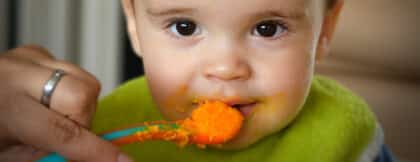Your children’s teeth need you! It’s recommended that parents assist their children with daily dental care until about the age of seven, when children have developed the coordination to brush and floss their teeth themselves. Showing your children how to care for their teeth now will set them up for a lifetime of great dental health. Help your children care for their teeth by teaching them:
-
- Correct toothbrushing
- Proper flossing
- How to use mouthwash
- The importance of a healthy diet
Correct Toothbrushing
The American Dental Association recommends brushing teeth twice a day for two minutes. Very young children will need you to brush their teeth for them. Kneeling beside them or laying them in your lap, brush every tooth on all sides, bottom and top. Explain the importance of daily dental care to your children. Songs or apps can help keep them entertained for the duration of the brushing.
Preschool age children can begin to brush their own teeth. Show them how to grip the toothbrush and brush back and forth in short, swift strokes on all sides of the tooth. The outer, inner, and chewing surfaces should all be brushed thoroughly, as well as behind the molars and the tongue. Take turns holding the toothbrush with your child to ensure that all of the teeth have been cleaned.
As children age, they can assume more responsibility for toothbrushing. You can reduce the time you spend brushing and spend more time supervising, making sure that all surfaces are being cleaned for the right amount of time. Encourage your children to apply enough pressure on the toothbrush to remove plaque and debris but not so hard as to damage gum tissue.
Proper Flossing
Preschoolers can begin to learn about proper flossing. String floss can be a little tricky for them to hold, so flossers might be a better choice for little fingers. Assist your children in cleaning around each tooth.
Show your older children how to use string floss by first cutting a length of floss. Have them wrap one end around each pointer finger. Then, forming a C around the back molar, show them how to scrape up and down along the tooth’s surface a few times before moving to the next tooth.
How to Use Mouthwash
If your children are aged six and up, you can show them how to use mouthwash. Start with an ADA-approved mouthwash with fluoride. Mouthwash rinses away debris from between the teeth and keeps teeth strong from the added fluoride. Show your children how to measure the right amount of mouthwash into the cap and swish. Fluoride can be harmful if ingested, so have your children spit it into the sink instead of swallowing it. It’s recommended that parents supervise mouthwash use until the age of twelve.
The Importance of a Healthy Diet
In addition to brushing and flossing, you can help your children care for their teeth by teaching them about the importance of eating healthfully. A diet rich in fruits and vegetables, lean meats, and whole grains will deliver essential vitamins and minerals needed for healthy teeth and gums. Teach your children to view sweets as an occasional treat instead of a diet staple. Explain how sugar contributes to tooth decay by forming acid that erodes tooth enamel. And encourage your children to drink water between meals. Water is the perfect beverage for teeth because it washes away food debris, lowers the acidity in the mouth, and keeps breath fresh.
Putting in the effort now to help your children care for their teeth will set them up for great oral health as they get older.
Affiliated Dentists offers pediatric dentistry in Madison, Wisconsin. If we can assist you in helping your children care for their teeth, please contact:


